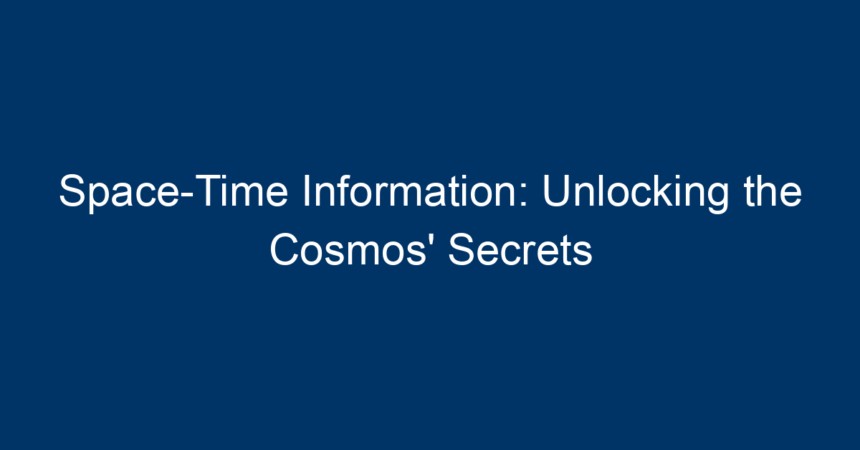Understanding the vastness of the universe has always captivated humanity. From the intricate intricacies of galaxies to the delicate dance of celestial bodies, our curiosity drives us to explore the cosmos. At the heart of this exploration lies a profound concept: space-time information. This article delves into what space-time information is, its significance, and how it can illuminate the mysteries of our universe.
What is Space-Time Information?
Defining Space-Time
To grasp space-time information, we first need to understand its foundational elements—space and time. Traditionally treated as separate entities, space and time were unified by Albert Einstein through his groundbreaking theory of relativity. In Einstein’s view, space is not just a static backdrop against which events unfold; rather, it is intertwined with time, creating a four-dimensional fabric known as ‘space-time.’
The Role of Information
In the context of physics, information refers to the data that describes the state of a system. In space-time, information is embedded in the way objects interact with each other and with the forces of nature. This interaction creates a tapestry of events that can be analyzed, leading to deeper insights about the universe.
The Importance of Space-Time Information
Unlocking Cosmic Mysteries
Space-time information has the potential to unlock some of the most profound mysteries of our universe:
-
Black Holes and Quantum Mechanics: Understanding the information paradox associated with black holes is a major research area in modern physics. The loss of information when matter crosses the event horizon challenges our understanding of quantum mechanics and general relativity.
-
Cosmic Microwave Background Radiation: This remnant radiation from the Big Bang carries invaluable information about the early universe. By analyzing it, cosmologists can infer the universe’s age, composition, and expansion rate.
- Gravitational Waves: The detection of gravitational waves has opened a new avenue for understanding space-time. These ripples in the fabric of space-time provide unique insights into violent cosmic events, such as black hole mergers and neutron star collisions.
A New Perspective on Space-Time
Recent theories, such as loop quantum gravity and string theory, offer alternative views on space-time and how information is structured within it. These theories suggest that the universe may be more interconnected than we previously thought, raising profound implications for our understanding of reality.
How to Analyze Space-Time Information
Methodologies in Research
Researchers employ various methodologies to analyze space-time information:
-
Mathematical Models: Theoretical physicists create mathematical frameworks to represent the complexities of space-time dynamics. These models help predict outcomes in various scenarios, from particle collisions to cosmological events.
-
Simulations: Advanced computational physics allows scientists to simulate cosmic events, providing visual and quantitative insight into space-time interactions.
- Experimental Observations: Ground-based and space-based telescopes gather empirical data about celestial phenomena, enriching our understanding of space-time information.
Data Analysis Techniques
Once data is collected, sophisticated techniques are applied:
-
Statistical Analysis: By employing statistical tools, researchers can detect patterns and correlations in large sets of astronomical data.
- Machine Learning: Artificial intelligence plays an increasingly prominent role in analyzing space-time data. Machine learning algorithms can identify anomalies and predict cosmic events more efficiently than ever.
Practical Applications of Space-Time Information
Advancements in Technology
The insights gained from space-time information translate into practical applications that touch our everyday lives:
-
GPS Technology: The Global Positioning System (GPS) requires adjustments based on relativistic effects, showcasing how our understanding of space-time informs technological development.
-
Telecommunications: Space-time principles are vital in the functioning of satellite communications, ensuring timely data transfer across vast distances.
- Medical Imaging: Techniques like MRI and PET scans leverage principles rooted in physics and space-time information to provide crucial health diagnostics.
Future Prospects
As we continue to unlock the secrets of space-time information, potential future advancements may include:
-
Quantum Computing: Innovations in quantum mechanics could revolutionize data processing, harnessing the complex nature of space-time for unparalleled computational power.
- Interstellar Travel: Space-time information may help develop theoretical models for warp drives or other forms of faster-than-light travel.
Challenges and Controversies
The Information Paradox
One of the primary challenges in understanding space-time information is the black hole information paradox. This debate posits that information entering a black hole may be irretrievably lost, contradicting quantum mechanics. Ongoing research aims to reconcile these conflicting theories, exploring concepts like ‘holographic principles’ that suggest information is encoded on a two-dimensional surface.
Ethical Considerations
As we push the boundaries of what we know, ethical considerations in space exploration and technology become increasingly significant. Questions arise regarding our responsibility to the cosmos, the utilization of space-time information, and the potential consequences of our advancements.
Conclusion: Toward a Deeper Understanding
Space-time information is more than just a scientific concept; it represents a profound journey into the depths of the universe. By examining how space and time are interconnected, we unlock secrets that could reshape our understanding of reality itself. From decoding cosmic mysteries to harnessing technological innovations, the implications of this knowledge are vast and impactful.
Actionable Insights
To engage with the wonders of space-time information, consider the following approaches:
-
Stay Informed: Follow reputable sources of scientific news to keep up with the latest discoveries in cosmology and physics.
-
Participate in Citizen Science: Many projects allow the public to assist in analyzing astronomical data, contributing directly to our understanding of space-time.
- Promote STEM Education: Support initiatives that emphasize science, technology, engineering, and mathematics education to inspire the next generation of explorers.
By understanding and embracing the power of space-time information, we can contribute to a collective human endeavor—unlocking the secrets of the cosmos and our place within it.




